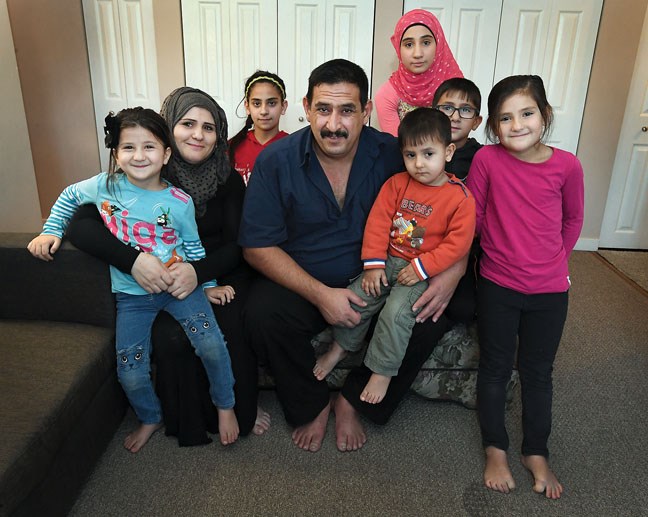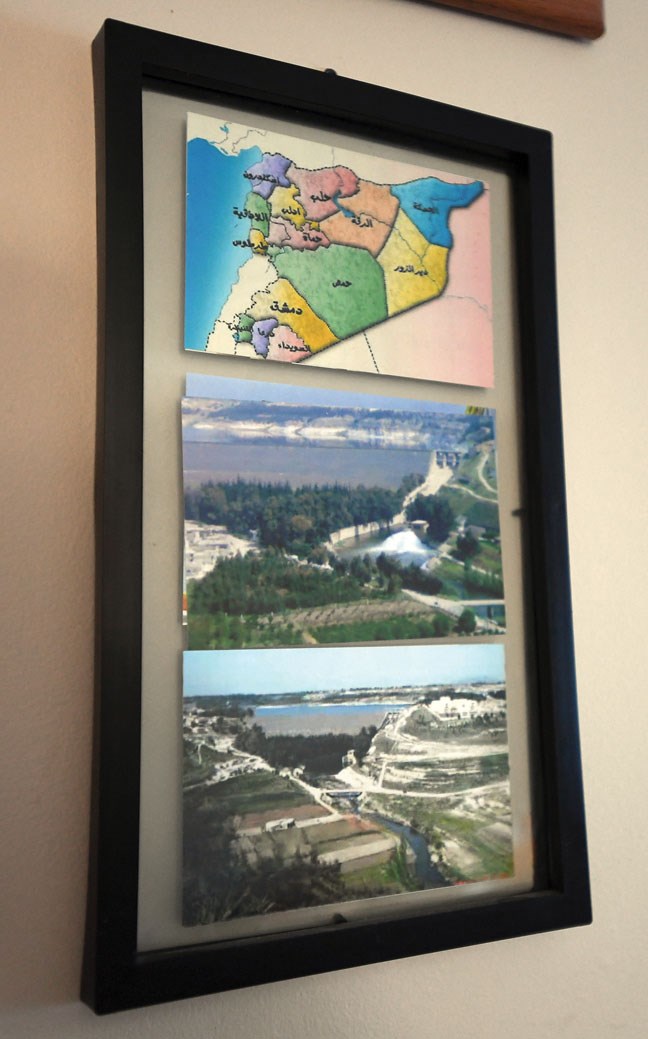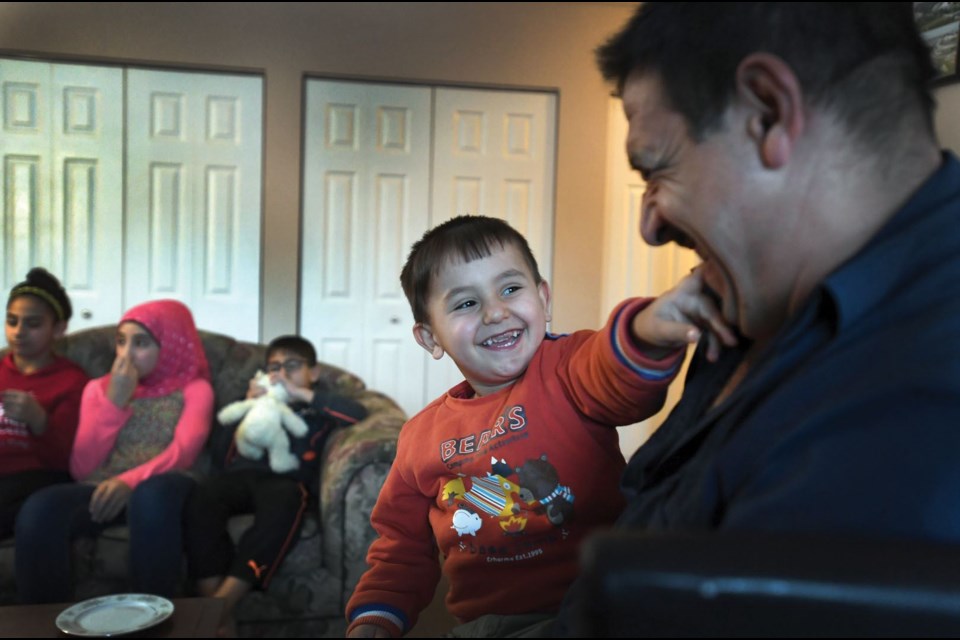Two-year-old Mohamad Khalaf tugs at his father's pant leg, reaching up to be pulled into his arms. He's cautious with strangers but the grin reaches his eyes when Mostafa Khalaf finally complies.
Mostafa and his wife Sahar sit in their warm living room surrounded by six children.
One of four government-sponsored families to move to Prince George this year, the Khalafs arrived in February after a month spent in Toronto.
They were part of the newly elected Liberal government's first phase bringing 25,000 Syrian refugees to Canada.
"It was a dream for us to come to Canada," says Mostafa in Arabic, translated through Rose Tohme, who also immigrated this year, but through private sponsors.
In Lebanon, the family waited four and a half years before getting the call to come to Canada.
They always knew Lebanon could not be a home. Work was hard to come by and Syrians were paid less.
"It was so hard to live in Lebanon. Very little work and also to take care of the need of his family," says Tohme, who switches between translating directly and explaining what Mostafa means.
They considered travelling illegally like so many others, but it would cost $15,000 Euros.
"His kids... they didn't go to school so when we thought to go by sea to Germany or to Europe it's just because to seek a good future for our children."

Mostafa says he wants his children to be doctors and Sahar says her dream is that "her children will have good education."
Their eldest, 13-year old Hajar, says being out of school during that time was "so hard."
She's happy to be back learning where she can "have friends and to talk with them," she says in English.
She's made friends at Peden Hill elementary, where three of her siblings also go, and she dreams of being a doctor.
Mostafa's dream is simple: find a job, build a life, be a contributing citizen.
"We Syrians, we work anything. We don't mind work," says Mostafa, pausing frequently to allow Tohme to translate.
"It's just we need to work. We like to work. It's very important for us to work."
Prince George was a good fit for them, a similar size to the town they're from, just outside of Homs. He says life in Canada has been "easy and good," but when pressed agrees waiting to find work while he learns a new language is hard.
"It's a kind of difficulty, it's not like frustrated," Tohme explains.
"It's a little bit difficult for us but we should learn English so we can be effective members in society," Mostafa expands.
They spend their days going to the Immigrant and Multicultural Services Society of Prince George for classes, shopping, studying at home and on Fridays they pray at the mosque.
"Studying English it takes the whole time," he says.
Mostafa used to work with marble and drove ambulances for five years. If he had a choice, he would be a driver again and has his full license, one of three who came with their Syrian driving license, Tohme says. The family owns a vehicle now, which they joke limits their ability to add more members.
"They were looking forward to having more kids but they start to think about the van," Mostafa jokes through Tohme. "This is what stopped them."
Tohme says she was helping them fill out the B.C. Housing forms and one asked if there would be any changes in family numbers in the next year.
"I said 'no,'" Tohme says firmly. "You can't say yes."
"If a van has nine passengers," he quips back.

Mostafa doesn't appear overly concerned about the upcoming deadline, at the one year mark in Canada, when Syrian refugees stop receiving the federal monthly living allowance and move to provincial social assistance.
"Yes, of course, feel worried. But we wish if we can find a job so we can be effective in this community."
"It's hard even with private sponsors," adds Tohme, who helps teach English at IMSS. "Praise God we are working now but who knows... It's like when a dad was holding his child's hand and was teaching him how to walk and then suddenly he will leave his hand and let him walking."
Are new refugees ready to "walk" in this way?
"I think it's not enough because you will never learn a language in a year," Tohme replies.
The Immigrant Services Society of B.C. interviewed some of the province's 2,100 government-assisted refugees and the majority have lower language levels. The December report said almost one year after arrival, 81 per cent self-assessed as having no or beginner-level English.
The Khalafs have found community with the six other Syrian families in Prince George, through their English classes and IMSS and the local mosque.
In the summer, Mostafa cooked traditional barbeque from the balcony of their McIntyre Crescent apartment and Tohme laughs at the memory of a man coming back for seconds and then with his wife.
"This is our tradition, we like to give and feed all people," Mostafa says.
During this meeting, the week before Christmas, Mostafa places two Syrian dishes on the table and serves more to his guests before their plates are clean.
Tohme says the family is generous and praises Mostafa for his humour. Every week, he amuses his teachers and classmates, says Tohme before asking permission to tell a story.
One day, Mostafa tried to leave early.
"He was registering everything for saying 'Goodbye,' 'Hello,' 'Nice to meet you," she says, so when he spoke Tohme was confused.
"I think he read something by mistake so in front of everyone he said 'Sorry I need to be a princess. Goodbye," Tohme recounts, barely speaking through laughter.
Before they moved to Canada, Mostafa said he knew the place was "lovely" and the country's citizens had human rights. Since, Mostafa says he's discovered "the sweet heart of the people.
"The sweetness, the generosity, the behaviour, the manners, the culture," lists Mostafa, who says Canada is home and he doesn't want to move back.
Seeing what Syria has become is a "strange feeling. Painful," he says.
"What happened in Aleppo, it was disaster. If anything thinks that it finished in Aleppo, the war, in Syria, it's not true," says Mostafa, adding no citizen is safe. "This is our country and our new country and we don't think we want to go back to Syria."
"We would like to all the Syrians come to Canada," he adds, while Sahar giggles.
"Sahar doesn't agree," says Tohme with a laugh. "She says whenever the war stops she will go back."
"And he will marry a Canadian woman, stay here," Mostafa says with a smile.
When the family left Syria, they purposefully left all physical reminders, too.
"Everything that we should bring with us it will be painful for us because it will remind of us of our country. So we don't want to remember, we don't want these painful memories," Mostafa says. "We came to here and we're going to start from the beginning."
People told them they wouldn't need luggage or clothes because Canadians would take care of them.
"This is what happened when we arrived to Canada, we got a lot of support."



